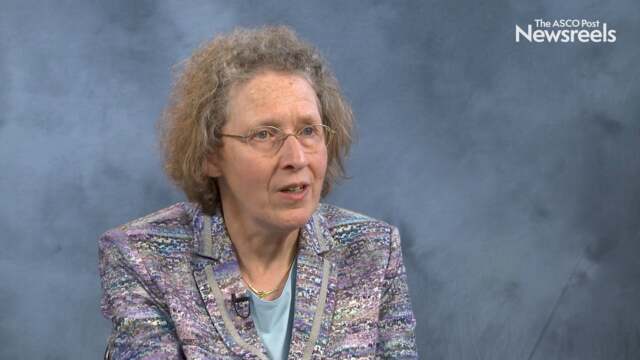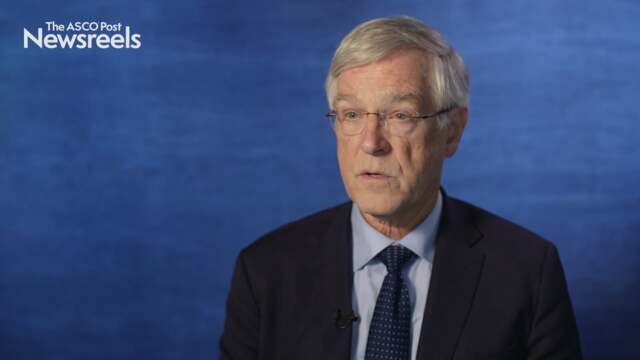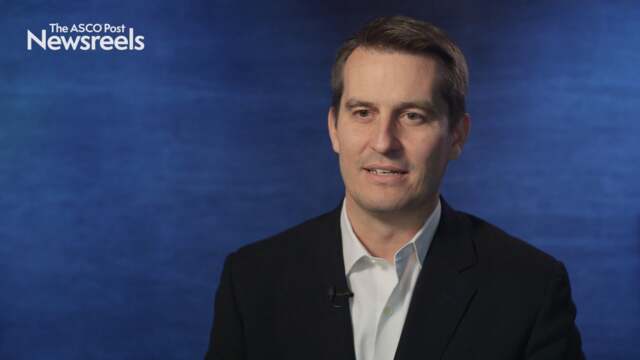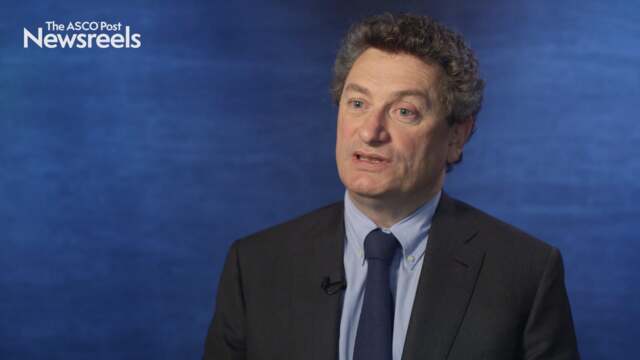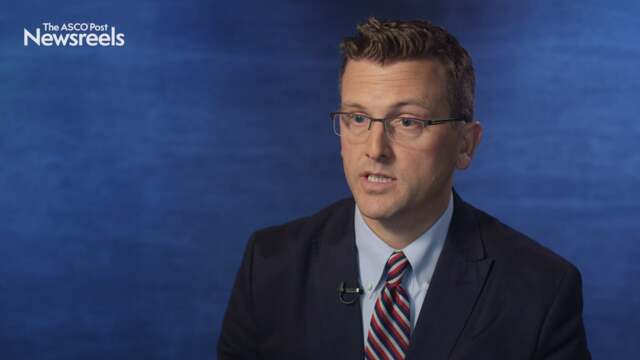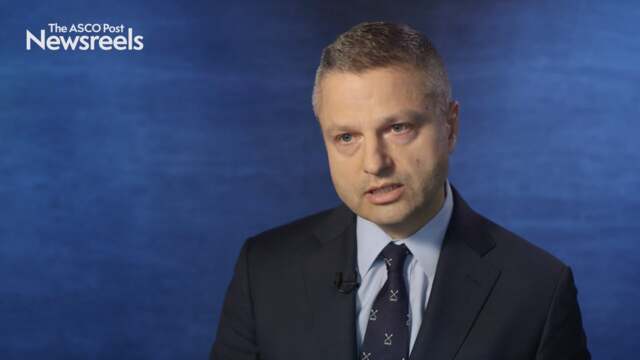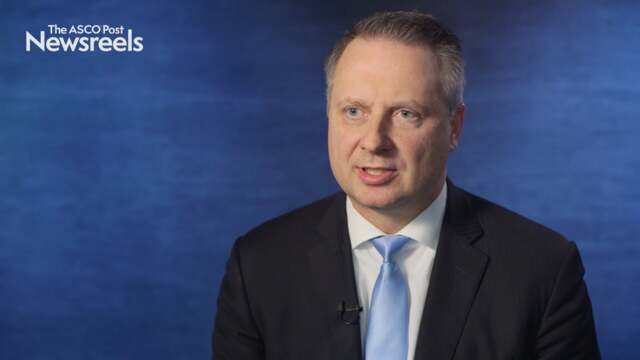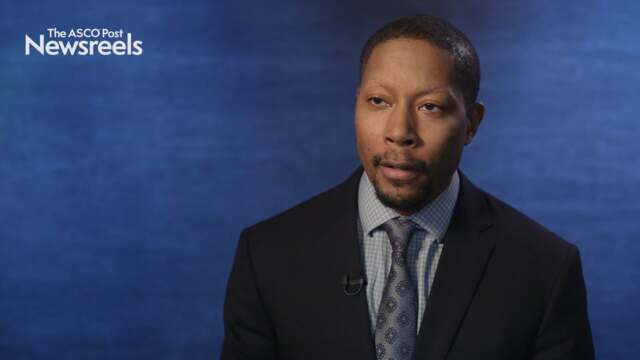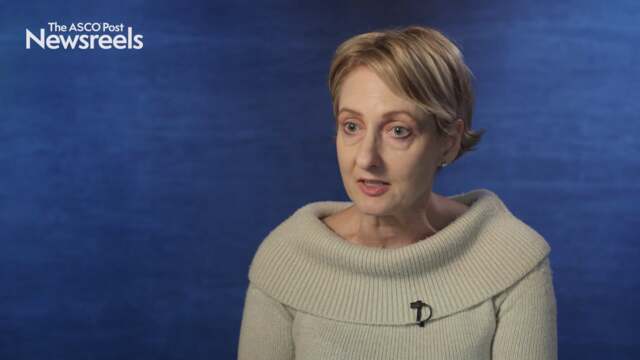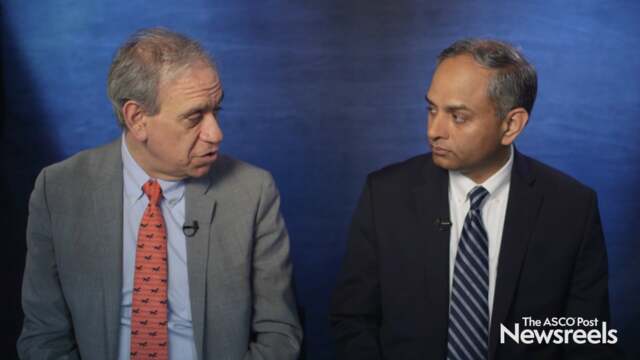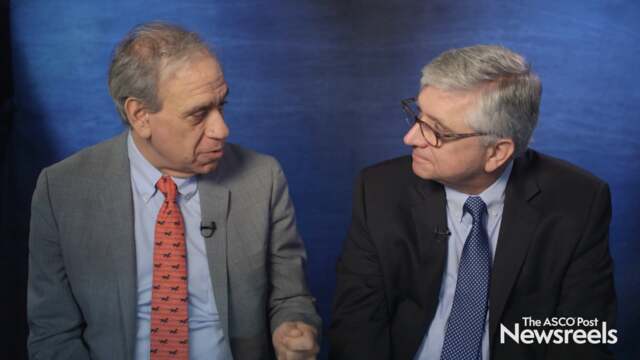Is CAR T-Cell Therapy Setting a New Standard of Care in Lymphoma?
Data presented at the 2017 American Society of Hematology (ASH) Annual Meeting & Exposition on the longer-term follow-up analysis of results from the ZUMA-1 trial investigating the effectiveness of axicabtagene ciloleucel (Yescarta) in patients with refractory non-Hodgkin lymphoma (NHL) showed...
FDA Expands Approval of Brentuximab Vedotin in Classical Hodgkin Lymphoma
ON MARCH 20, the U.S. Food and Drug Administration (FDA) approved brentuximab vedotin (Adcetris), an antibody-drug conjugate, to treat adult patients with previously untreated stage III or IV classical Hodgkin lymphoma in combination with chemotherapy. Brentuximab vedotin combines an antibody and...
Extended Follow-up of Nivolumab Treatment in Relapsed/Refractory Classical Hodgkin Lymphoma After Failure of Autologous HCT
As reported by Armand and colleagues in the Journal of Clinical Oncology, extended follow-up of the phase II CheckMate 205 trial continues to show benefits and good tolerability of nivolumab (Opdivo) treatment in relapsed or refractory classical Hodgkin lymphoma after failure of autologous ...
Brentuximab Vedotin Plus Bendamustine in Relapsed or Refractory Hodgkin Lymphoma
A phase I/II trial has shown that the addition of brentuximab vedotin (Adcetris) to bendamustine is active in relapsed or refractory Hodgkin lymphoma. The study findings were reported in The Lancet Oncology by Owen A. O’Connor, MD, of the Center for Lymphoid Malignancies, Columbia University...
BTK Inhibitor in Relapsed or Refractory Mantle Cell Lymphoma
A phase II study (ACE-LY-004) reported in The Lancet by Michael Wang, MD, of The University of Texas MD Anderson Cancer Center, and colleagues showed durable responses with the Bruton tyrosine kinase inhibitor acalabrutinib (Calquence) in patients with relapsed or refractory mantle cell lymphoma....
Solid Organ Transplantation and Lymphoma
Survival of patients with Hodgkin and non-Hodgkin lymphomas is increasing, and with that comes the need, in some cases, for solid organ transplantation, often because of treatment-related toxicity. The factors involved in organ transplant among lymphoma survivors were discussed by Philip J....
Bruton Tyrosine Kinase Inhibitor in Relapsed or Refractory Mantle Cell Lymphoma
A phase II study (ACE-LY-004) reported in The Lancet by Michael Wang, MD, of The University of Texas MD Anderson Cancer Center, and colleagues showed durable responses with the Bruton tyrosine kinase inhibitor acalabrutinib (Calquence) in patients with relapsed or refractory mantle cell lymphoma....
FDA Updates Public Information About Known Risk of Lymphoma From Breast Implants
On March 21, the U.S. Food and Drug Administration (FDA) issued updated information about its understanding of breast implant–associated anaplastic large cell lymphoma (ALCL). The agency is providing an updated number of medical device reports (ie, adverse event reports) and medical...
FDA Expands Approval of Brentuximab Vedotin for First-Line Treatment of Stage III or IV Classical Hodgkin Lymphoma in Combination With Chemotherapy
On March 20, the U.S. Food and Drug Administration (FDA) approved brentuximab vedotin (Adcetris) to treat adult patients with previously untreated stage III or IV classical Hodgkin lymphoma in combination with chemotherapy. “Today’s approval represents an improvement in the initial...
CAR T-Cell Therapy in Refractory B-Cell Lymphomas
As reported at the 2017 American Society of Hematology Annual Meeting & Exposition and in The New England Journal of Medicine, Stephen J. Schuster, MD, of the Perelman School of Medicine at the University of Pennsylvania, and colleagues found that chimeric antigen receptor (CAR) T-cell...
Proud to Be a Pioneer in CAR T-Cell Therapy
Six years ago, I was 38 years old and, like many young people, took life for granted. I had two young daughters, ages 7 years and 4 months, and a wife I adored. And, except for a nagging pain on the left side of my abdomen, I was blessed with good health. Then, suddenly, the pain became so...
TAT 2018: Epigenetics Therapy Shows Promise in Patients With Lymphoma
New compounds targeting epigenetics have shown early activity in patients with lymphoma, according to data presented at the TAT (Targeted Anticancer Therapies) International Congress 2018 in Paris. The meeting, which focused on phase I research, featured early clinical studies with BET inhibitors...
Gene-Expression Profiling Score for Predicting High- vs Low-Risk of Follicular Lymphoma Progression
As reported in The Lancet Oncology, Huet et al have developed a 23-gene expression profile that predicts risk of follicular lymphoma progression. Study Details In a training cohort consisting of a subgroup of patients from the PRIMA trial (in which rituximab [Rituxan] maintenance was evaluated...
Responses Reported With CAR T-Cell Therapy in High-Risk NHL
LISOCABTAGENE MARALEUCEL (Liso-cel; JCAR017), a CD19-directed chimeric antigen receptor (CAR) T-cell therapy with defined composition, has shown “potent and durable” responses in poor-prognosis patients with relapsed or refractory aggressive non-Hodgkin lymphoma (NHL) in a phase I trial.1 According ...
FDA Approves sBLA Updating Nivolumab Dosing Schedule Across Indications
On March 6, Bristol-Myers Squibb announced the U.S. Food and Drug Administration (FDA) has approved a supplemental Biologics License Application (sBLA) updating the nivolumab (Opdivo) dosing schedule to include 480 mg infused every 4 weeks for a majority of approved indications. This approval will ...
Flora E. van Leeuwen, PhD, on Hodgkin Lymphoma Treatment: Toxicities in Female Survivors
Flora E. van Leeuwen, PhD, of the Netherlands Cancer Institute, discusses cardiovascular disease risk after treatment-induced primary ovarian insufficiency in female survivors of Hodgkin lymphoma (Abstract 114).
Association of MHC Class II and PD-L1 Expression With Outcome in Classical Hodgkin Lymphoma
As reported in the Journal of Clinical Oncology, Roemer et al found that programmed death cell ligand 1 (PD-L1) expression and major histocompatibility complex (MHC) class II positivity on Hodgkin Reed-Sternberg (HRS) cells may predict favorable outcome with programmed cell death protein 1 (PD-1)...
Releasing Follicular Lymphoma From the Curse of Frankenstein
In the December 10, 2017, issue of The ASCO Post, I authored an article in which I raised the possibility of curing follicular lymphoma without the dreaded chemotherapy. Clearly, no good deed goes unpunished: My good friend and The ASCO Post’s editor Jim Armitage, MD, challenged me to defend that...
Long-Term Follow-up in Follicular Lymphoma: SWOG Phase III Trial Reports Outcomes
As reported in the Journal of Clinical Oncology by Shadman et al, long-term follow-up of patients with previously untreated advanced-stage follicular lymphoma in the phase III SWOG-S0016 trial has shown continued good outcomes with both R-CHOP (rituximab [Rituxan] plus cyclophosphamide,...
Long-Term Results of PET-Adapted Therapy for Advanced Hodgkin Lymphoma
As reported by Gallamini et al in the Journal of Clinical Oncology, the Italian GITIL/FIL HD 0607 trial has shown good long-term outcomes with the switch from ABVD (doxorubicin, vinblastine, vincristine, and dacarbazine) to escalated BEACOPP (bleomycin, etoposide, doxorubicin, cyclophosphamide,...
Update on CAR T-Cell ‘Breakthrough’ Therapy in Lymphoma
Primary analysis of the JULIET trial adds to mounting evidence that chimeric antigen receptor (CAR) T-cell therapy is effective for the treatment of lymphoma in patients with no other good treatment options. A single infusion of CAR T cells (CTL019) achieved durable remissions in almost 40% of...
Best Outcomes to Date in Older Patients With Hodgkin Lymphoma
Older patients with Hodgkin lymphoma typically do not fare as well as younger patients on standard regimens. A phase II study reported the best outcomes to date in older patients with Hodgkin lymphoma who were treated with sequential brentuximab vedotin (Adcetris) before and after a regimen of...
Mogamulizumab in Cutaneous T-Cell Lymphoma
The anti-CCR4 monoclonal antibody mogamulizumab may answer an unmet need in providing an effective treatment of cutaneous T-cell lymphoma. In the phase III MAVORIC trial reported at the 2017 American Society of Hematology (ASH) Annual Meeting & Exposition, treatment with mogamulizumab was...
ECHELON-1: A Commendable Study, but Questions Remain
“The important thing is not to stop questioning. Curiosity has its own reason for existing.” —Albert Einstein The phase III international ECHELON-1 study, designed to evaluate brentuximab vedotin (Adcetris) as part of a front-line chemotherapy regimen for previously untreated advanced classic...
Tumor-Specific T Cells and Response in Relapsed Hodgkin Lymphoma
In a study reported in the Journal of Clinical Oncology, Bollard et al found that T cells with forced expression of dominant-negative transforming growth factor-β (TGF-β) receptor type 2 (DNRII) that targeted the Epstein Barr virus (EBV)-derived tumor antigens latent membrane proteins...
FDA Accepts sBLA, Grants Priority Review for Tisagenlecleucel in Adults With DLBCL
Today, the U.S. Food and Drug Administration (FDA) accepted for Priority Review a supplemental Biologics License Application (sBLA) for tisagenlecleucel (Kymriah) suspension for intravenous infusion (formerly CTL019) for the treatment of adult patients with relapsed or refractory diffuse large...
Study Finds Association Between Breast Implants and Risk of Anaplastic Large Cell Lymphoma
In a Dutch study reported in JAMA Oncology, de Boer et al found that breast implants were associated with an increased risk of anaplastic large cell lymphoma (ALCL) in the breast, although the absolute risk was small. Study Details In the study, all patients diagnosed with primary non-Hodgkin...
Brentuximab Vedotin Plus Bendamustine in Relapsed/Refractory Hodgkin Lymphoma
A phase I/II trial has shown that the addition of brentuximab vedotin (Adcetris) to bendamustine is active in relapsed or refractory Hodgkin lymphoma. Study findings were reported in The Lancet Oncology by O’Connor et al. Study Details In the study, 64 patients with Hodgkin lymphoma and 1...
FDA Accepts sBLA, Grants Priority Review for Brentuximab Vedotin in Advanced Hodgkin Lymphoma
On January 2, the U.S. Food and Drug Administration (FDA) accepted for filing a supplemental Biologics License Application (sBLA) for brentuximab vedotin (Adcetris) in combination with chemotherapy for the front-line treatment of patients with advanced classical Hodgkin lymphoma. The FDA also...
Another PI3K Inhibitor Welcome For Use in Indolent Lymphoma
PHOSPHATIDYLINOSITOL 3-KINASE (PI3K) signaling is important for the proliferation and survival of malignant B cells. Copanlisib (Aliqopa) is a novel pan-class PI3K inhibitor with predominant activity against PI3K-alpha and PI3K-delta isoforms. As reviewed in this issue of The ASCO Post, a phase II ...
PI3K Inhibition With Copanlisib in Relapsed or Refractory Indolent Lymphoma
AS REPORTED in the Journal of Clinical Oncology by Martin Dreyling, MD, PhD, of University Hospital, Ludwig Maximilians University of Munich, and colleagues, the phase II CHRONOS-1 trial has shown a high response rate and durable responses with the phosphatidylinositol 3-kinase (PI3K) inhibitor...
Obinutuzumab in Previously Untreated Follicular Lymphoma
On November 16, 2017, obinutuzumab (Gazyva) was granted regular approval in combination with chemotherapy, followed by obinutuzumab monotherapy for patients achieving at least a partial remission, for the treatment of adult patients with previously untreated stage II bulky, III, or IV follicular...
Front-Line Brentuximab Plus AVD vs Standard ABVD in Advanced Hodgkin Lymphoma
FRONT-LINE TREATMENT of advanced Hodgkin lymphoma with brentuximab vedotin (Adcetris) plus doxorubicin/ vinblastine/dacarbazine (A+AVD) achieved superior outcomes compared with the standard four-drug regimen of doxorubicin/bleomycin/vinblastine/dacarbazine (ABVD). The substitution of brentuximab...
Updated Follow-up of ZUMA-1 Confirms Benefit of CAR T-Cell Therapy in Aggressive B-Cell Lymphoma
POSITIVE DATA about chimeric antigen receptor (CAR) T-cell therapy in lymphoma continue to accrue. Long-term follow-up of the pivotal ZUMA-1 trial shows that patients with refractory diffuse large B-cell lymphoma (DLBCL) continue to have durable responses to the CD19-directed CAR T-cell therapy...
ICER Releases Draft Evidence Report on CAR T-Cell Therapy for B-Cell Cancers
On December 19, the Institute for Clinical and Economic Review (ICER) released a Draft Evidence Report assessing the comparative clinical effectiveness and value of tisagenlecleucel (Kymriah) and axicabtagene ciloleucel (Yescarta). The draft report, along with draft voting...
BTK Inhibitor in Relapsed or Refractory Mantle Cell Lymphoma
A phase II study (ACE-LY-004) reported in The Lancet by Wang et al showed durable responses with the Bruton tyrosine kinase inhibitor acalabrutinib (Calquence) in patients with relapsed or refractory mantle cell lymphoma. The study supported the recent approval of acalabrutinib in this setting....
CAR T-Cell Therapy in Refractory B-Cell Lymphomas
As reported at the recent American Society of Hematology Annual Meeting & Exposition and in The New England Journal of Medicine, Schuster et al found that chimeric antigen receptor (CAR) T-cell therapy produced responses in a high proportion of patients with B-cell lymphomas refractory to or...
ASH 2017: Acalabrutinib Demonstrates Activity in Relapsed or Refractory Mantle Cell Lymphoma
At the 59th American Society of Hematology (ASH) Annual Meeting & Exposition, Wang et al presented results from the open-label, single-arm phase II ACE-LY-004 clinical trial, which served as the basis for the recent U.S. Food and Drug Administration (FDA) accelerated approval of acalabrutinib...
ASH 2017: ALCANZA Trial: Brentuximab Vedotin in CD30-Expressing Cutaneous T-Cell Lymphoma
Updated results from the phase III ALCANZA clinical trial evaluating brentuximab vedotin (Adcetris) in CD30-expressing cutaneous T-cell lymphoma (CTCL) were presented by Horwitz et al at the 59th American Society of Hematology (ASH) Annual Meeting & Exposition (Abstract 1509). The presentation...
ASH 2017: People Aged 75 Years and Older Are Underrepresented in Blood Cancer Clinical Trials
In the first comprehensive analysis of clinical trial enrollment among older adults with blood cancers, researchers from the U.S. Food and Drug Administration (FDA) found significant gaps in participation among those aged 75 and older when considered against the incidence of these malignancies in...
Joseph M. Connors, MD, on Untreated Hodgkin Lymphoma: Results From the ECHELON-1 Trial
Joseph M. Connors, MD, of the British Columbia Cancer Agency, discusses study findings on a new front-line option: brentuximab vedotin plus doxorubicin, vinblastine, and dacarbazine in patients with previously untreated stage III or IV Hodgkin lymphoma (Abstract 6).
Brian T. Hill, MD, PhD, on Mantle Cell Lymphoma in Younger Patients: Improvement in Overall Survival
Brian T. Hill, MD, PhD, of the Cleveland Clinic, discusses study findings that showed consolidation with autologous hematopoietic cell transplant in the first remission improves overall survival in patients younger than age 65 (Abstract 341).
Gilles A. Salles, MD, PhD, on Follicular Lymphoma: Long-Term Results From the PRIMA Trial
Gilles A. Salles, MD, PhD, of the Université de Lyon, discusses study findings on rituximab maintenance after induction immunochemotherapy and the significant long-term progression-free survival benefit over observation (Abstract 486).
Mark J. Roschewski, MD, on Burkitt Lymphoma: Clinical Trial Results on DA-EPOCH-R
Mark J. Roschewski, MD, of the National Cancer Institute, discusses phase II study findings that showed DA-EPOCH-R cures most adult patients with Burkitt lymphoma, irrespective of HIV status (Abstract 188).
Jakub Svoboda, MD, on Primary Mediastinal Large B-Cell, Diffuse Large B-Cell, and Gray Zone Lymphomas: Early-Phase Treatment Findings
Jakub Svoboda, MD, of the Abramson Cancer Center, University of Pennsylvania, discusses some encouraging phase I/II results on brentuximab vedotin with R-CHP chemotherapy as front-line treatment of CD30-positive primary mediastinal large B-cell, diffuse large B-cell, and gray zone lymphomas (Abstract 191).
Andrew M. Evens, DO, on Gray Zone Lymphoma: Results From a Multicenter Study
Andrew M. Evens, DO, of Tufts University, discusses findings on the effectiveness of DLBCL-based therapy for patients whose disease fell between diffuse large B-cell and classical Hodgkin lymphoma (Abstract 375).
Tycel J. Phillips, MD, on Intravascular DLBCL: Study of Patient Features and Outcomes
Tycel J. Phillips, MD, of the University of Michigan Medical School, discusses the findings of the largest retrospective study to date of patients with intravascular diffuse large B-cell lymphoma, a disease with a poor outcome, partly due to the difficulty in diagnosing it early (Abstract 377).
Laurie H. Sehn, MD, MPH, on DLBCL: Radiation Therapy Findings
Laurie H. Sehn, MD, MPH, of the British Columbia Cancer Agency and University of British Columbia, discusses long-term results of PET-guided radiation therapy in patients with advanced-stage diffuse large B-cell lymphoma treated with R-CHOP (Abstract 823).
Andrew D. Zelenetz, MD, PhD, and Sattva S. Neelapu, MD, on NHL: Results From the ZUMA-1 Trial
Andrew D. Zelenetz, MD, PhD, of Memorial Sloan Kettering Cancer Center, and Sattva S. Neelapu, MD, of The University of Texas MD Anderson Cancer Center, discuss long-term study findings on axicabtagene ciloleucel in patients with refractory aggressive non-Hodgkin lymphoma (Abstract 578).
Andrew D. Zelenetz, MD, PhD, and Stephen J. Schuster, MD, on DLBCL: Results of the JULIET Trial
Andrew D. Zelenetz, MD, PhD, of Memorial Sloan Kettering Cancer Center, and Stephen J. Schuster, MD, of the Abramson Cancer Center, University of Pennsylvania, discuss phase II findings on tisagenlecleucel in adult patients with relapsed or refractory diffuse large B-cell lymphoma (Abstract 577).
